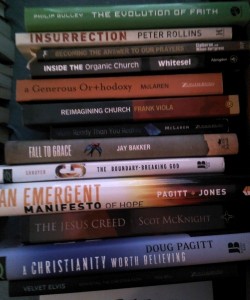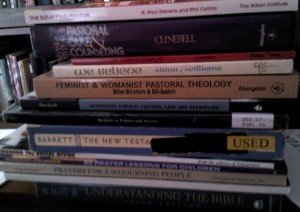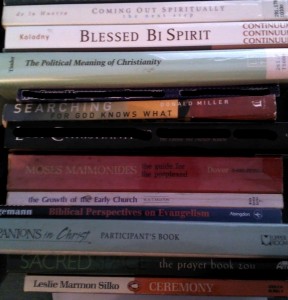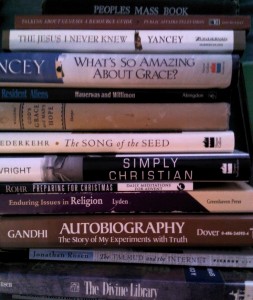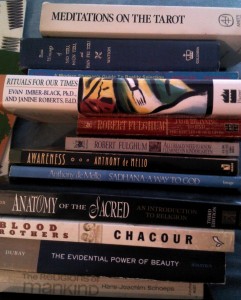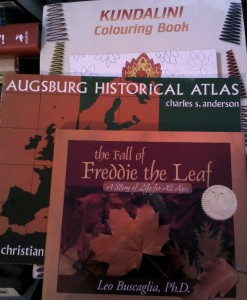Well, I had determined that I wouldn’t write about this until I was done with the series. But then, I kept falling into rants about it with friends and family. So here’s some quickly jotted opinions from one person who:
a) saw the Jackson movies first, and knew nothing of Tolkien’s universe beyond those films, until a month ago,
b) doesn’t have the best memory for details (especially for content that isn’t emotionally significant), and so may blur together or forget elements of the films, but
c) saw each of the movies several times… not because I liked them, but because I didn’t mind them, and many people around me wanted to see them frequently. So I tend to believe that a Venn diagram of what the filmmakers prioritized and focused on and what I came away with will overlap a great deal.
You should also know that I hold storytelling in very high regard, and I treasure filmmaking as an art… though I loathe the Hollywoodification of stories, and that last will play a huge part of my growing dislike for the films. For me, Hollywoodification centers around the erosion of unique styles of storytelling and creative perspectives, in order to fit a rigid template of storytelling considering the most sellable. It often includes flattening rich characters into stereotypes or “one-word characters†(the innocent one, the brooding one, etc.), not just because of time constraints but to dumb down characters so Hollywood audiences know how to relate to them. Hollywoodification also frequently includes shoehorning cookiecutter romance into any story.
I greatly enjoyed the book “Fellowship of the Ringâ€, and plan to have a relationship with it that isn’t all about the films! But this post will be a compilation of my thoughts on approaching the books after the films, and on comparing the two (and finding the films lacking).
The first thing I noticed is that the book does not open with a feeling of EPICness. The films – from first to last – were EPIC with EPIC hobbits and EPIC New Zealand. Everything was dazzling and bigger than life from the first moments, as the Shire sprawled out in front of us. This is very different than the quiet, homey beginnings of the book. The hobbits’ world is circumscribed. Most of them haven’t traveled outside the Shire, and their knowledge of the outside world is patchy and scarce. The non-Shire world is an exotic and dangerous place, and those who frequent it are by turns romantic and suspect. I felt the Shire as a familiar place by the time they left it. The emotional space Tolkien gives at the beginning of the book is a pleasant, manageable place to start a journey, and I feel after reading Fellowship of the Ring that I have actually been on part of a journey that is changing me. The movie was more of a travelogue of exotic places to visit, the Shire being the first.
I have intentionally been putting effort into giving the characters different faces than they had in the movies, just to allow the book as much room as possible to exist outside my experience of the films. This can be challenging because, while Tolkien easily spends a quarter of his word count describing the weather, the entirety of his physical descriptions of characters might just possibly fit on a single page!
To understate profoundly, Tolkien has a way with words. So it’s not surprising that a significant portion of the dialogue came directly from the book, in pivotal and in small scenes.
“It has been called that before, but not by you.â€
“I will take the Ring, though I do not know the way.â€
“It is hardly possible to separate you from him, even when he is summoned to a secret council and you are not.â€
“There are older and fouler things than Orcs in the deep parts of the world.â€
“That spear thrust would have skewered a wild boar.â€
“Fly, you fools!†1
“Is it not a strange fate that we should suffer so much fear and doubt over so small a thing!â€
I’m not sure that the looksism of the movie will be mirrored quite so strongly in the book, as far as good being beautiful and evil being ugly. Tolkien’s already played with that a bit. This is something I’ll reserve judgment (and comment) on for now.
I want to talk for a second about what I’ll call “shoutouts.†In adapting a book to a movie, you generally have a story that is far too long for the medium you are adapting it to, and you must cut or condense. The perennial question is, do you include a larger number of events from the book, and give them far less attention? Or do you reduce the number of events and characters – removing many entirely – in order to focus better on what’s left? With such a series as LOTR, Jackson did have to cut some things out completely. The journey that takes the hobbits to Tom Bombadil is one sad example (but, okay, if you have to). But it’s clear that a great number of writing decisions were made not to tell the story itself, but to reference the story Tolkien wrote, to give a wink to already-established fans without explaining enough to actually tell the story to those that haven’t heard it. My frustrations are with these shoutouts: at what was left in, but glossed over… Lothlorien being my biggest frustration. As far as I knew – from seeing FOTR multiple times, mind you – Galadriel was random Elven royalty, and Lothlorien was a place for the Fellowship to restock their supplies. There’s several different reasons this aggravates me, one of them I’ll return to in a moment. And another reason is a thematic issue that I will have to reserve judgment on until I’m done reading. But I will share my suspicions that an Eden-like land with a woman that quotes Jesus of Nazareth2 might be more important to Tolkien and Tolkien’s story than Jackson suggests in his film.
Additionally, the more shout-outs you have, the larger the ‘just because’ movie-logic looms over the story. The shoutouts increase the number of actions that appear to me in my first visit to Middle Earth as simply the way things are done. Nearly every decision made as to how the Fellowship would travel, for example, was made in the film just because. We’ll go this way or that because it’s the best. People in the know have decided. Throughout the book, decision-making is a more harrowing, more realistic experience. Various people with various incomplete knowledge and skill sets do the best they can to reason out the best decisions on partial information, and we see their angst and struggle. This is a constant vulnerability in the book that speaks deeply to me, that I felt not a whit of in the film.
And I want to talk about the women. On a very personal note, I actually had a loathsome experience watching the first movie in the theatres. I was with my father, and while I found Arwen’s depiction problematic in a number of ways, he fell in love with her. He was visibly moved by this character, and obviously considered her a kind of ideal woman. His feelings, combined with my problems with her portrayal, highlighted a LOT that was wrong about our relationship as I grew up, all rooted in stereotypes of what is feminine, and what is valued in women’s behavior and appearance. To quickly summarize my problems with her portrayal:
A) While she is portrayed as powerful, her so-called power is entirely dependent on her father’s power, and this fact is pretty explicitly involved in the run-in Jackson fabricates between her and the ringwraiths;
B) in said run-in with all nine ringwraiths, she walks away with one, inch-long thin red mark daintily placed upon her cheek, and is otherwise composed and glamorous;
C) She is the far larger part of two named female characters in the movie, and both are Elven. As movie elves, they are beautiful, thin, dainty, never dirty, always composed, ethereal, billowy and distant. Since this is already a problematic female stereotype for me, having two separate characters as the entirety of the female cast BOTH represent this actually made me pretty nauseous.
Despite all this, my impression was that this was one of those old stories written by men that didn’t have any decent female roles, so we’d just have to make our own. I got the impression the script writers were doing us a favor making Arwen a larger part and a stronger woman, and so I let it slide that it was “Hollywood†female strength and not actual female strength.
Then, I met Galadriel in the book.
Mother fuckers. Seriously? As I said before, to my mind the movie Galadriel was random elven royalty (and I don’t have much use for royalty). I know I don’t fully understand yet what Tolkien’s doing thematically with Celeborn, Galadriel and Lothlorien. But Galadriel is a powerful figure in her own right, just completely wiped out of having any significant role in the movie. Which makes it clear to me that having substantial women’s roles really wasn’t a priority for the writers.
I can’t quite put words to it yet, but the characterizations of Frodo in particular and the hobbits in general are so much richer and more satisfying in the book. There’s more than one action or behavior of Frodo’s in the book that enriched his character, that wasn’t present or was only faintly present in the movie. The largest example I’m thinking of was him actually slowly becoming aware of Gollum’s presence, slowly discerning the meaning of the clues he had heard and seen. In the movie, Gandalf hands him (and us) this answer. He is streamlined to the point of feeling like a rather blank character in the films in general. The strongest content of his film character is just generally being the least silly of the hobbits. Hobbits as a whole in the film are only one small step away from being comic relief, which I don’t feel is at all fair to their representation in the book.
In one last comparison, I will say that I was really entirely unaware of any history of animosity between Elves and Dwarves. This is a regretful elimination, as the various exchanges on the subject, and the layers of relationship built between Legolas and Gimli, are all very satisfying in the book.
Now, for a couple of observations of the book unrelated to the movie. My friend Lexi, who inspired me to read the books, mentioned Tolkien’s love of trees, and that shines through in a lovely way in the text. Though I don’t have words now, I know I’ll have something to say about Tolkien’s profound way of relating to the physical landscape of Middle Earth.
It will certainly be best to wait to say much on matters of theology until I’ve seen where Tolkien takes his narrative. But I am thankful that in the books so far, he is not as pedantic as other Christian writers I’ve seen (I’m looking at you, Clive). For this reason, I think I can embrace parts of his story that mean something very different to him than they do to me.
I can see glimpses of what he has famously called his view of “the long defeat†— a concept he describes as quintessentially Roman Catholic, and a concept I am unfamiliar with (and can’t find much on, actually, other than references to Tolkien himself). On one hand, I think the idea of humanity progressing linearly into greater and greater moral and scientific quality is a dangerous narrative. “Progress†as an idea leads easily to ranking societies by who’s more advanced/moral, to a feeling of invincibility in Western culture that we will only keep going and becoming “greater†and to general historical blindness, and attitudes that things have never been better than they are right now. Clearly, an idea called “the long defeat†doesn’t sound progressive. 🙂 It may be the reverse, however: the idea that we once had perfection, and have slowly been falling further and further away from it. It’s my impression that he has built Lothlorien as Eden-like, as perfect at least in how it used to be. The Elves in the first book describe how the world will change, even if Sauron’s evil is defeated. It is clear that things will never be the same. I don’t find value in the idea of anything being or having been perfect. Life just is. Yes, there is better and worse, there is more just and less just, or more loving and less loving. But perfection again requires a ranking of diverse ways of being that I do not desire. It requires layers upon layers of value judgments to define what is and isn’t perfect. It requires an unchangingness that to me is antithetical to life itself. Now, my dislike of perfection certainly stems from my own experience of twelve step work (itself based in certain Christian theologies); admitting that perfection is not possible in this broken world is a survival mechanism for me. But I still find nothing valuable in envisioning a perfect paradise, either at the beginning or at the end of all things. Will this be a hindrance to enjoying the ultimate shape of the book narrative? I don’t know yet. I don’t think so. The sense of mourning in the Elven culture resonates with me. Grief is grief. And one major element of all this that Tolkien weaves together resonates oh so deeply with me: that awareness that defeating evil will not make us who were were when we started our journey. The Elves say that Middle Earth will never be the same. I know certainly that Frodo will never be the same as he was on page one. That single aspect of his journey is what has drawn me into the story more than anything else — that journey of one individual, living with pain and evil moment by moment, every day, and striving not to be overcome by it. That’s what’s really appealing to me, and I want to see Tolkien’s version of that tale.
1. Though, remarkably, the phrasing of Ian McKellen’s now meme-ish line “You shall not passâ€, has changed from what it is in the book, “You cannot passâ€.
2. Galadriel quotes from the canonical gospels when she says “Do not let your hearts be troubled,†from the passage supposedly of Jesus’ words: “Peace I leave with you, my peace I give to you. I do not give to you as the world gives. Do not let your hearts be troubled and do not let them be afraid.†I remember noticing a second quote, but I don’t immediately find it again.
 Weetzie Bat by Francesca Lia Block
Weetzie Bat by Francesca Lia Block